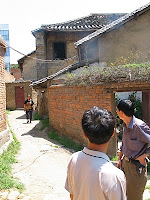Lao Papa
Saturday, August 23, 2008
At our grandsons’ ages, six weeks of development equals a full year of coursework at a major university. Sometime since our last visit, Nilo (now three months) learned to return a smile, and Natu (at twenty-three months) had both picked up names for all the other members of the family and begun to group words into phrases. As fast as I offered him new words, he took them, repeated them a dozen times, and made them his own. On a walk together, we studied the web of a Metepiera sp. in a rosemary bush and watched the spider hide under her protective tent. Then we continued on and played with Agelenids, Uloborids, and a Holocnemus in their webs. We saw a line of ants on the sidewalk and he got down on his stomach to watch them closely, repeating, “Ants, ants, ants, ants.” Then on our return trip, he ran to the rosemary bush, calling out, “Spider house! Spider house!”
This visit, for the first time, he called us Grandma and Papa.
Of course, this means I am now labeled. When Natu was born, my wife asked me what I wanted my grandchildren to call me. I wasn’t sure. It isn’t often in our culture that we get to choose a name for ourselves. I had a Grandpa Lynn and a Grandpa Howard, but somehow Grandpa Brian never seemed right. My mother’s grandfathers were Gramp (yeah, I could be a Gramp) and Grandfather (well, that might be a little too formal). I had second cousins whose grandfathers were Pa’s Pa and Ma’s Pa, which tickled me but didn’t fit me. When I spoke to infant Natu in the third person, I found myself using Papa, the same name my children called my father-in-law (though I’m not sure whether it came from Spanish or Italian, each an influence in my wife’s family). In Natu’s bilingualism, the first vowel has elongated to be a more Portuguese PAA-pa. (In contrast, Natu’s father is Pa-PA-i.). His grandfather in Brazil will have a name altogether different.
However, as my family grows, we are about to leap beyond our European linguistic influences. Early next year I expect to add a Mandarin-speaking daughter-in-law. I am very pleased with that thought. It was an early personal goal that all of my children would grow up as polylinguals and world citizens, and by the grace of God, they have. So at a new stage in life, as I have the opportunity to pick a new name, that aspect of my life could be part of the mix. I asked Middle Son how to say grandfather in Mandarin. The choices seem to be YeYe, or Lao Ye. Lao by itself is an honorific that might be used as a means of address between two longtime friends, such as “Lao Wang” and “Lao Chang,” to be translated as “Old Wang” and “Old Chang.” That kind of appealed to me. I began to think about Lao Papa.
But it may be too late. Natu already has me labeled, and the pattern he sets will be followed by all the grandchildren I hope are yet to come. And you know what? In my grandson’s voice, it sounds pretty good.
Labels: Bilingualism, Brazil, China, Entomology, Grandparenting, Language Acquisition, Linguistics, Milestones, Spiders






